Body Aches & Pain? 5 Soothing Essential Oils for Pain Relief
In a hurry? Click here to read the Article Summary...
Whether you’re a fitness aficionado, an overworked parent, a weed-whacking gardener, a student with a sore neck from studying, or a senior with aching joints, no doubt at some point you’ve needed some relief from muscle and/or joint pain. While the popular option is usually to pop a couple of NSAIDs such as aspirin or ibuprofen, let’s examine why that approach may not always be your best, and other drug-free options – such as essential oils for pain relief – that may provide your body the support it needs without the potential side effects.
Why Not Just Use NSAIDs for Pain?
Why not just take a non-steroidal anti-inflammatory drug (NSAID) when you’re experiencing muscle or joint pain? Certainly many people do, but did you know that NSAIDs come with some potentially serious side effects, including increased risk of heart attack, stroke, and gastrointestinal (GI) bleeding – a warning that is stated on each and every bottle. According to one 2015 study [1]:
“GI complications resulting from NSAID use are among the most common drug side effects in the United States, due to the widespread use of NSAIDs. The risk of upper GI complications can occur even with short-term NSAID use…”
There are certain factors that may increase GI injury when taking NSAIDs. These risk factors include:

- having a previous history of GI injury
- advanced age
- concurrent use of (taking at the same time) medications such as aspirin, anticoagulants like heparin or warfarin, corticosteroids, and selective serotonin reuptake inhibitors (SSRI – anti-depressant) drugs
Not only does there need to be a greater awareness of these potential risks, but awareness of less-risky alternatives for helping to manage minor body aches and pain where appropriate.
5 of the Best Essential Oils for Pain Relief
Enter essential oils: a much safer method of delivering soothing relief right to the area where it is needed and bypassing the GI tract.
The best essential oils for pain relief are those proven to provide comfort to sore, tired, aching, overworked muscles and joints. You can use these essential oils solo or combine two or more for a synergistic support against body aches and pains. Here are 5 of the best essential oils for pain relief:
- Ginger (Zingiber officinale)
- Wintergreen (Gaultheria procumbens)
- Rosemary (Rosmarinus Officinalis)
- Clove (Syzygium aromaticum)
- Frankincense (Boswellia carterii)
1. Ginger (Zingiber officinale)
Ginger has five millennia (yes, that’s 5,000 years!) of historical use. This warming, stimulating, and aromatic oil has been used extensively for digestive health, improving circulation, boosting energy, and for pain relief.
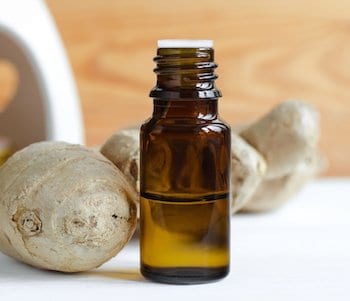
2013 research [2] found ginger essential oil to have anti-inflammatory and antioxidant properties, as well as antinociceptive action. Pain specialists consider antinociception to be the best form of pain relief because it works by blocking the detection of pain by nerves.
When painful menstrual cramping is a problem, ginger can be of assistance. A 2012 clinical study [3] followed 120 students, all of whom suffered severe menstrual cramps. The students were divided into two groups; one that received a placebo and one that took ginger capsules internally two days prior to the commencement of their periods, and for three days during their periods. Researchers found that those in the ginger group had significant easing of intensity and duration of pain.
If the pain you are experiencing is accompanied by inflammation, ginger is beneficial here, as well. A 2014 study [4] found that among seven different plants examined, ginger exhibited the highest anti-inflammatory activity. Indeed, a 2016 study [5] also investigated the anti-inflammatory properties of ginger essential oil on rats with rheumatoid arthritis. Researchers discovered that ginger oil prevented chronic joint inflammation in the rats.
2. Wintergreen (Gaultheria procumbens)
Wintergreen is an evergreen shrub with huge benefits for painful, aching muscles and joints. It is excellent for the temporary relief of backaches, muscle or joint pain caused by sprains, strains, arthritis, and bruising. It offers relief in two main ways:
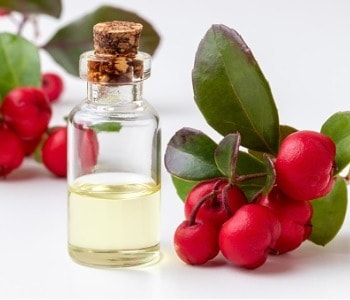
- The primary phytochemical present in wintergreen is methyl salicylate. It is this component (also found in birch bark) that Mother Nature must have intended for us to use for pain relief. It’s rather like spreading aspirin right into your skin. In fact, when aspirin was first synthesized by Bayer in the late 1890s, it was this phytochemical that was copied in the lab to create salicylic acid, a patentable substance [6,7].
- Wintergreen oil is also highly anti-inflammatory, helping to relieve much of the inflammation that often attends injuries. Wintergreen inhibits the production of pro-inflammatory cytokines (chemical messengers) such as TNF-alpha, interleukin-6, and interleukin-1-beta. It also suppresses the activation of a signaling pathway known as NF-kB. The effects of wintergreen have been described as similar to those of cyclooxygenase (COX) inhibitors from NSAIDs [8].
Wintergreen extracts are often present in over-the-counter muscle rubs, sports creams, and liniments for these two important reasons.
3. Rosemary (Rosmarinus officinalis)
Rosemary also has centuries of historical use going back to the Greeks and Romans. It was used extensively for pain relief, memory enhancement, and for cleansing the air of “evil vapors.”
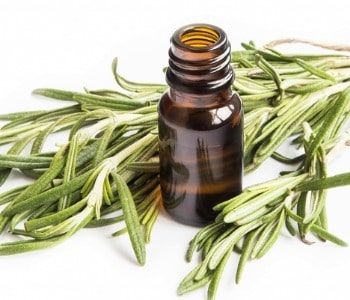
A 2000 study [9] found that it was the presence of the phytochemical 1,8-Cineole that conferred anti-inflammatory and antinociceptive (pain blocking) properties in rosemary oil. Remember that antinociception is better than just relieving pain because it blocks a nerve’s ability to detect pain.
A 2015 animal study [10] found that rosemary essential oil had analgesic effects and combined well with both codeine and paracetamol.
Does it work in humans, though? Indeed it does, according to researchers. A 2017 clinical study [11] found that for patients undergoing dialysis and having problems with pain, topical application of rosemary (menthol was also used) alleviated the severity and frequency of musculoskeletal pain.
4. Clove (Syzygium aromaticum)
Before dentists had modern numbing agents like procaine (Novocaine®), they applied clove oil topically to the area on which they were working. Clove has two main phytochemicals that are responsible for the pain blocking, anti-inflammatory, and anesthetic effects – eugenol and beta-caryophyllene.
The phytochemicals from clove oil are so effective at blocking pain and relieving inflammation, researchers have been working on ways to synthesize them [12].
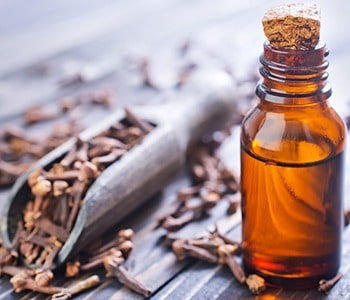
Studies done in 2009 [13] and 2016 [14] with animals found that eugenol had significant antinociceptive (pain-blocking) and anti-inflammatory effects.
Clove also appears to be helpful for period pain. A small 2013 clinical trial [15] with nursing students suffering from menstrual pain showed that abdominal massage using cinnamon, clove, rose, and lavender essential oils was effective in relieving painful cramping.
A 2001 study [16] investigated the anesthetic effects of the phytochemical beta-caryophyllene. Researchers found that that beta-caryophyllene exerted both in vitro (in the test tube) and in vivo (in the body) local anesthetic effects comparable to those of procaine.
5. Frankincense (Boswellia carterii)
Frankincense was one of the best-known oils and resins in ancient times. There are more than 50 references to frankincense in the Christian Bible. Frankincense has been used down through the centuries for its muscle relaxing, healing, and anti-depressant properties.
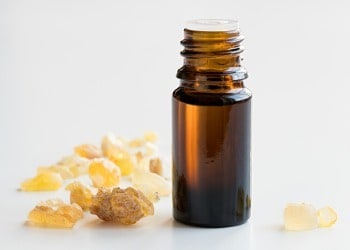
Modern research shows us that frankincense does much more than that, however. In addition to those benefits, frankincense also has immune-stimulating activity [17], battles fatigue [18], fights inflammation [19], helps to promote joint health, and has been studied as a treatment for osteoarthritis [20,21].
Frankincense combined with ginger may also be beneficial for heavy menstrual periods. A small 2019 clinical trial [22] investigated the use of frankincense and ginger for 102 women with heavy menstrual bleeding. All patients received ibuprofen and either frankincense and ginger, or a placebo. Decreased duration of menstrual bleeding and an increased improvement in quality of life was experienced in the frankincense and ginger group, but not the placebo group.
4 Tips For Using Essential Oils for Pain Relief
Here are ways you can use essential oils for pain relief individually or combine two or more to make a blend:
Editor’s Note: Organixx used to carry an essential blend called Relief that was a blend of ginger, wintergreen, rosemary, clove, and frankincense essential oils. If you have any Organixx Relief Essential Oil blend, these are also some ways you can use it.
- For Muscle and Joint Pain
Apply topically to area of concern, rubbing in thoroughly. Dilute with an organic carrier oil like coconut, almond, avocado, or hemp (heavily if you have sensitive skin). If using fairly frequently (as in hourly), it is best to dilute heavily with a carrier oil to avoid skin sensitivity. We suggest using 5 drops of essential oil per teaspoon of carrier oil. For any persistent pain, always consult with your doctor. - For Respiratory Conditions and Congestion
Place a couple drops of essential oil into your palms, rub them together, and place hands over your nose and mouth. Be careful to avoid your eyes, which are very sensitive to the vapors. Deeply breathe in the oils for a few moments, holding the vapor in your lungs for 5-10 seconds (or as long as you can). This is a great way of getting the essential oils into your lungs and bloodstream and working quickly to relieve chest and nasal congestion. - For Menstrual Cramps/Period Pain
Apply topically to the abdominal area and low back, diluting with an organic carrier oil like coconut, almond, or hemp as described above in Tip #1. - Headaches.
Using a cool mist ultrasonic diffuser, diffuse to help ease headaches. If headache persists, see your doctor.
Words of Caution When Using Essential Oils for Pain
Never apply essential oils anywhere near your eyes, the inside of the ears, or to other sensitive regions of the body.
Women who are pregnant or breastfeeding should NOT use essential oils without first consulting with a qualified healthcare provider. While some essential oils are safe for children and pets, others are harmful. Again, always seek guidance from a qualified practitioner.
Finally, essential oil products vary greatly between makers in purity, strength, and quality. Be sure to only purchase organic essential oils from reputable companies.
The powerhouse trio of herbs in Magi-Complexx Essential Oil provides the strongest, most synergistic healing effect, helping sufferers of arthritis pain, constant muscle aches and pains, neuropathy, systemic inflammation, slowed wound healing, circulatory challenges, as well as skin irritations like eczema, psoriasis, and acne.
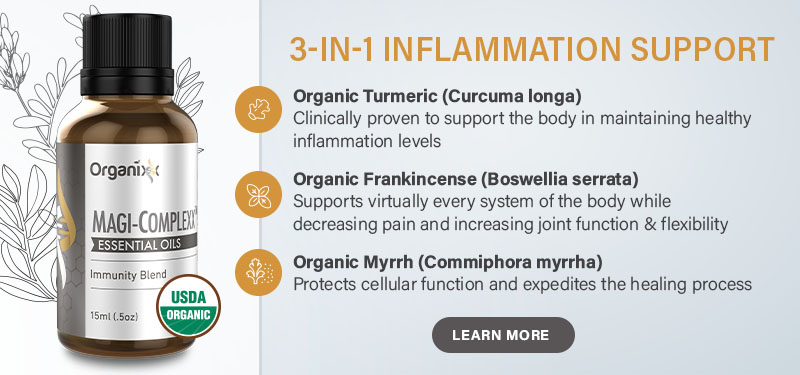
 Sources:
Sources:
Article Summary
Almost everyone experiences muscle and/or joint pain at some point. The popular option is to pop a couple of NSAIDs such as aspirin or ibuprofen.
NSAIDs (non-steroidal anti-inflammatory drugs) come with some potentially serious side effects, including increased risk of heart attack, stroke, and gastrointestinal (GI) bleeding.
For minor aches & pains, essential oils can be a much safer method of delivering soothing relief right to the area where it is needed.
These 5 essential oils for pain relief have been studied for their effect on pain and inflammation:
- Ginger
- Wintergreen
- Rosemary
- Clove
- Frankincense
Four ways to use these oils individually or as a blend are for (see article for specifics):
- Muscle & Joint Pain
- Respiratory Congestion
- Menstrual Cramps
- Headaches


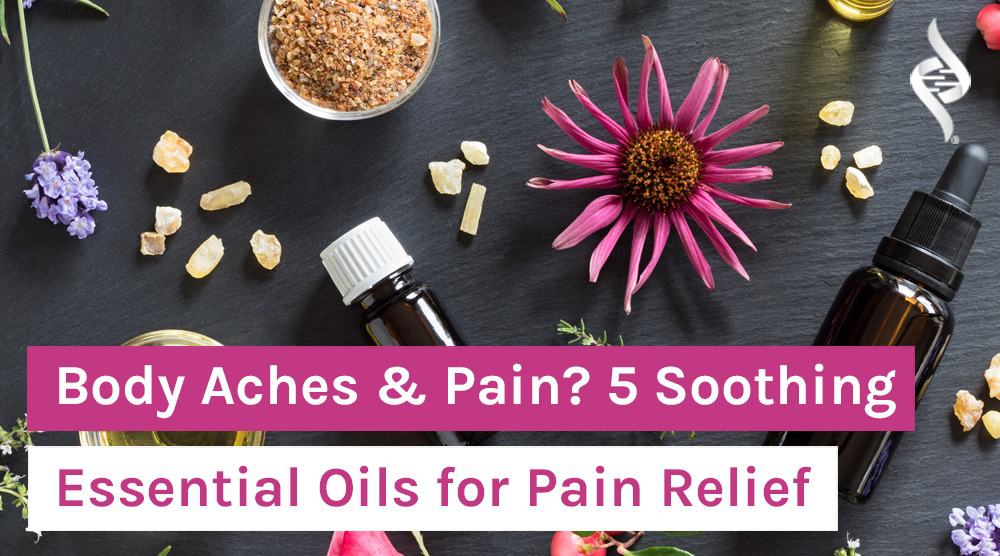
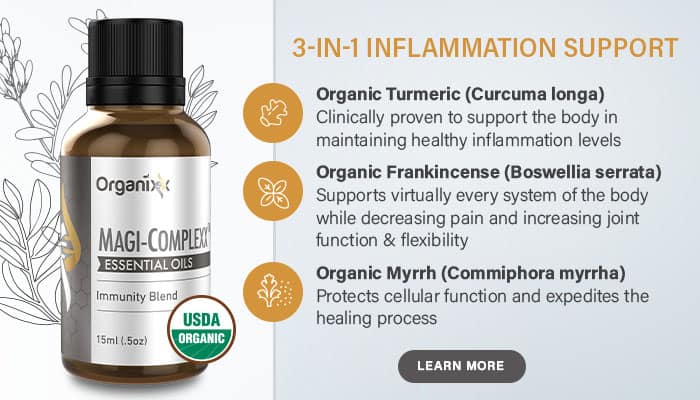

Hello, Do Organixx Company, do wholesale?
Hi Cheryl, thanks for your question.
Yes, we do have a wholesale/affiliate department.
To find out more about our affiliate program, please reach out to our affiliate managers for more details by emailing [email protected].
Please visit this website link if you would like to apply for a wholesale account with us:
https://organixx.com/wholesaleapplication/
Once your application has been completed, one of our wholesale agents will be in touch with you.
If you would like to speak with our Wholesale Department before filling out an application, you may contact them by calling 1-877-625-9679 or by emailing [email protected].
We hope this helps and wish you a happy & healthy day!!
I received relief oil as a gift when I bought iodine. Do I just put a few drops in with a carrier oil for knee pain?
Hi Lisa, we are glad to know you received your gift of Relief Essential Oil!
Relief Essential Oil is a mix of ginger, wintergreen, rosemary, clove, and frankincense essential oils. This blend is used as a nice compliment for trips to the gym or a busy daily routine. The cooling sensation inspires an upbeat and energetic feeling that will keep you active. Apply generously on your temples or the back of your neck. We encourage you to do a small skin test to make certain you do not have a reaction.
You may also find this article helpful about Relief Essential Oil:
https://organixx.com/relief-essential-oil-blend/
We hope this helps!
Thanks Joe! I’ll give the essential oil a try. I never have use them before. Have a great day!
I might like to try these but I am not a professional nor a well read user of oils. How much of each to help joints or are they used individually to see which helps most? Also the price of each s necessary. I use your products but have never thought of oils to treat joint pain before. Thank you